
Miser
Definition - one who is extremely stingy with money
The parent of English misery, miserable, and miser is the Latin adjective miser, meaning "wretched" or "unfortunate." The first of this family to enter the English language is misery in the 14th century. Miserable follows soon after, and then miser, circa 1500.
Miser was originally used as an adjective meaning "stingy" or "penurious," as in "a miser father." As an adjective, it is still occasionally used; however, the synonymous miserly is used much more frequently. The related noun form begins being used by mid-16th century in reference to a wretched, miserable person. By the century's end, miser gains its familiar sense denoting a mean, grasping person who is extremely stingy with money.
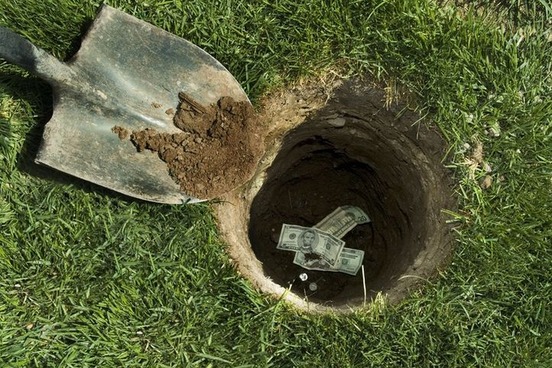
Chuff
Definition - boor, churl
Although we don't know where it came from, we do know that chuff has been a name for anyone boorish, churlish, miserly, or just generally disliked since the 15th century. Early spellings include chuffe, chuffe, and sometimes chough.
"Tressilian!" answered Foster, "what know I of Tressilian?—I never heard his name."
"Why, villain, it was the very Cornish chough to whom old Sir Hugh Robsart destined his pretty Amy; and hither the hot-brained fool has come to look after his fair runaway. There must be some order taken with him, for he thinks he hath wrong, and is not the mean hind that will sit down with it."
— Sir Walter Scott, Kenilworth, 1821
In the same novel, Scott uses the spelling chuff in reference to a miserly character.
… if Anthony be so wealthy a chuff as report speaks him, he may prove the philosopher's stone to me, and convert my groats into fair rose-nobles again.
The use of the two spellings may have been intentional. Chough is also the name of a bird related to the crow that appears in Cornish folklore (and Scott did specify "Cornish chough"). According to one Cornish legend, King Arthur's soul migrated into the body of a red-billed, red-footed chough. (The red and black coloring of the bird has obvious symbolism in death.) The bird is also often associated with thievery, mischievousness, and misfortune. In his book on his travels through Great Britain, English author Daniel Defoe wrote of the bird:
… it will steal and carry away any thing it finds about the house, that is not too heavy, tho' not fit for its food; … sometimes they say it has stolen bits of firebrands, or lighted candles, and lodged them in the stacks of corn, and the thatch of barns and houses, and set them on fire; but this I only had by oral tradition.
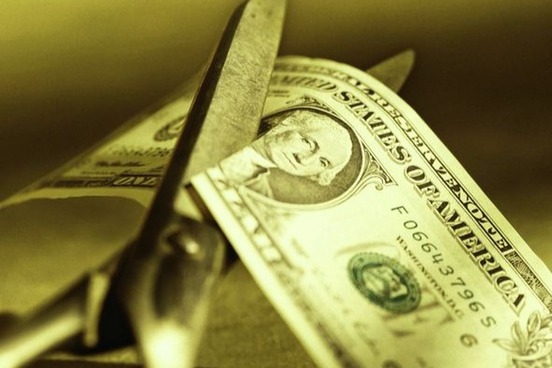
Carl and Churl
Definition - a stingy morose person
In Old English, a carl was a man of the common people—he was the baseborn laborer, farmer, or craftsman of the village. The name is a borrowing of Old Norse karl, of similar meaning. In the 15th century, carl began being applied as a term of contempt for a churlish fellow, and then, specifically, to a person who turns crusty when it comes to money matters. This miserly sense is now chiefly used in Scottish English.
None is so much the thieves mark as the myser and the Carle.
— Thomas Nashe, Christ's Tears over Jerusalem, 1593
Carl as a term for a contemptible fellow survives in some English dialects. In everyday goings-on, you're likely to encounter a friendly fellow with the forename Carl.
Another English word akin to Old Norse karl is churl. In Old English, the word was used in the form ceorl and had the various meanings of "man," "husband," or "a freeman of the lowest rank in Anglo-Saxon England." During the period between the 13th and 17th centuries, churl was also applied to a servile serf or bondman. The word's common disparaging sense for a rude, ill-bred person originated in the 1300s. By the 16th century, a churl, like a carl, was known as a stingy person who you didn't want to associate with, much like Ebenezer Scrooge.
When the churles barnes were full, hee bad his soule rest, thinking to gaine rest by covetousnes, that he might say. Riches gaine rest as wel as godliness….
— Henry Smith, A Sermon of the Benefite of Contention, 1591
Although churl most often denotes a straight-up rude or ill-mannered person, its miserly sense is occasionally used.
A "weekend break" here often implies some engagement with the elements. In Europe a weekend break almost always means an urban trip, or a countryside stay…. If America’s commitment to the outdoors is plain, where it comes from is mysterious. One answer is the providential bounty. The US has scenic splendour and bankable weather. Only a churl would not put them to some use of a summer (or winter).
— Janan Ganesh, The Financial Times, 24 Aug. 2018

Skinflint
Definition - a person who would save, gain, or extort money by any means
The term skinflint existed with the meaning "a person who would save, gain, or extort money by any means" as early as 1699. Back in those days, soldiers used flints to produce the spark necessary to discharge their rifles. Legend has it that one commander was so cheap that he gave his soldiers shavings that he had scraped or "skinned" from a flint because he was too cheap to provide them with whole flints. For this, he earned the title "Skinflint."
Of course, only the cheapest person would try to "skin" a flint. And so anyone who is considered tight with a buck came to be called a "skinflint."
I’m afraid to bring this up with friends in case they call me a “Karen” or tell me I’m being selfish or a skinflint.
— Marketwatch.com10 May 2023
Additionally, the phrase "skin a flint" came to denote a willingness to go to extremes to save or gain something. Its use is documented earlier than that of skinflint, in the mid-1600s (which calls into question the "legend"). Daniel Defoe gives a later example of the phrase from The Complete English Tradesman in which he describes the tradesman as possessing such a character "that he will skin a Flint, that he will buy cheaper than any Man can fell, and sell dearer than any Man can buy."
The phrase "to flay a flint" also appears around the same time as "to skin a flint" (but with a little more meanness implied). In time, people began to use flayflint the same way as skinflint.
There lived a flayflint near; we stole his fruit, his hens, his eggs….
— Lord Alfred Tennyson, "Walking to the Mail," 1842
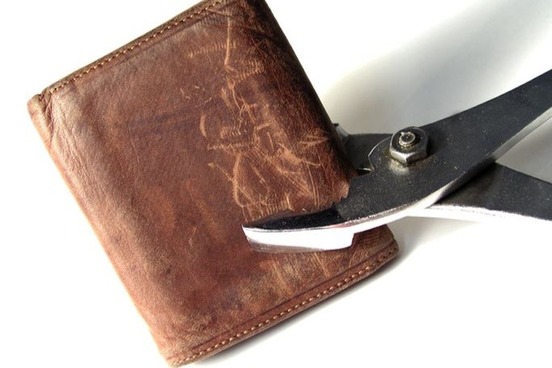
Curmudgeon
Definition - a crusty, ill-tempered, and usually old man; miser
It was some time in the late 1500s that the word curmudgeon mysteriously appeared in the English language as a word for a miserly, ill-tempered, and often elderly person. To this day, etymologists can't figure out from where this stranger originated.
But see here, my dear young lady, I'm an old miser and curmudgeon, as you may have heard. I HATE to part with my money, even for a good reason. And I NEVER part with any of it, unless I am to receive some benefit from the expenditure.
— L. M. Montgomery, The Story Girl, 1911
There are a couple false etymologies of curmudgeon. A popular one is that it is a derivative of cornmudgin, a name for a dealer in corn. The words are somewhat similar, but the first recorded instance of cornmudgin is in a 1600 translation of a book on Roman history whereas evidence of curmudgeon is found as early as 1587. And, honestly, the connection between a corn-dealer and a person who is easily annoyed or angered is unclear. Corn-dealers couldn't be all that bad.
Another theory is that curmudgeon is connected with cur, a word for a mongrel dog or a surly or cowardly person. Cur is a shortening of Middle English curdogge from the verb curren ("to growl") and dogge ("dog"), and it is distantly related to various Germanic words meaning "to growl," "to grunt," and "to grumble"—all of which might be done by a curmudgeon. That gives us a possible source for the first part of curmudgeon, but we are left in the dark concerning the "mudgeon."
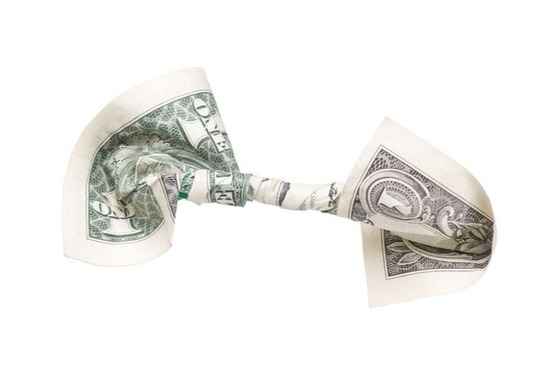
Piker
Definition - one who does things in a small way; tightwad, cheapskate
Piker can refer to a tightwad, a cheapskate, or basically anyone who does not like to spend or give money. One theory on the word's origin connects it to a nickname given to Missourians in the 19th century around the time of the 1849 Gold Rush. A county or two to the north of St. Louis on the Mississippi is Pike County, Missouri, and directly across the river from it is Pike County, Illinois; both counties, in the past, supposedly had a large population of yokels, many of which headed for California to seek a better life. This migration was memorialized in folk songs, such as "Sweet Betsey from Pike":
Oh don't you remember sweet Betsey from Pike, / Who crossed the big mountains with her lover Ike, / With two yoke of cattle, a large yellow dog, / A tall Shanghai rooster, and one spotted hog; / Saying goodbye, Pike County, / Farewell for a while; / We'll come back again / When we've panned out our pile.
— Carl Sandburg, The American Songbag, 1927
We can't say whether the unflattering characterization of Pike Countians as yokels was deserved or not, and we have no idea as to what incidents caused them to be despised by Californians. However, we do know that, for whatever reason, Californians developed a marked antipathy for Missourians and expressed their dislike for them by using Piker (also Pike) as a pejorative term. As example, an 1857 publication explained Pike as "a household word" in San Francisco used to designate people with "a happy compound of verdancy and ruffianism."
From being a term for a Missourian who migrated to California exhibiting undesirable social characteristics, Piker was broadened as a general term of contempt for other migrants to California and later was applied, still pejoratively, to various kinds of small-time gamblers.
Nowadays, when encountered, Piker is used of a person of mean and petty habits or outlook and to people noted for their unwillingness to spend money or pay their fair share. The connection with Pike County, Missouri, is all but forgotten except by etymologists.
To get a better sense of just how much money, let's take a virtual stroll down K Street and see what everyone is spending on the world's second-oldest profession. It's all laid out for us by OpenSecrets.org. The defense lobby? Pikers. They contributed $24 million to individuals and PACS during the last election cycle. The farm lobby? $65 million. Health care? We're getting warmer. Health care was the No. 2 industry, at $167 million.
— Kevin Drum, Mother Jones, January/February 2010

Hunks
Definition - a surly ill-natured person; especially : a miser
Early print evidence of slangy hunks (also spelled hunx), which refers to a surly, ill-natured person or a miser, appears about the year 1600. It is of unknown origin, but many great literary writers have made it known.
So, whether he lives or dies, what does it come to? That you become the sole inheritor of the wealth of this rich old hunks, that you and I spend it together, and that you get into the bargain a beautiful young wife.
— Charles Dickens, The Old Curiosity Shop, 1841One fellow comes and borrows my money, and goes out and calls me a stingy old hunks because I won't let him cheat me.
— Charles Kingsley, Two Years Ago, 1857"It is the most infernal shame," said Losely between his grinded teeth, "that I should be driven to these wretched dens for a lodging, while that man, who ought to feel bound to maintain me, should be rolling in wealth, and cottoned up in a palace. But he shall fork out. Sophy must be hunted up. I will clothe her in rags like these. She shall sit at his street-door. I will shame the miserly hunks."
— Edward Bulwer-Lytton, What Will He Do With It?, 1858Old Ruggles had declared that Ruby should never have a shilling of his money; hereupon Crumb had anathematised old Ruggles and his money too, telling him that he was an old hunx, and that he had driven the girl away by his cruelty.
— Anthony Trollope, The Way We Live Now, 1875

Scrooge
Definition - a miserly person
Charles Dickens gave us the term Scrooge for a miserly person, especially one around the holidays. In his short novel A Christmas Carol, in Prose: Being a Ghost Story of Christmas, published in 1843, the character Ebenezer Scrooge, through a series of spectral visions, is allowed to review his life and to change its outcome. The Ghost of Christmas Past reveals vignettes of Scrooge's early life as a schoolboy, an apprentice, and a young man in love. The Ghost of Christmas Present reveals to Scrooge that joy has little to do with wealth by visiting the homes of Bob Cratchit, Scrooge's much-abused clerk, and of his generous nephew Fred. Finally, the Ghost of Christmas Yet to Come allows Scrooge a vision of what his end will be like if he continues on his present course: he will die despised and unmourned.
After witnessing these scenes, Scrooge is a changed man, and he ultimately gives up his miserly ways; however, when people use the word Scrooge in an allusion to the story, they use it to mean the kind of person Scrooge was before being visited by the ghosts. That's not because people using Scrooge in this way don't know how the story ends. It's only because it's the pre-redemption Scrooge who haunts us and our language.
It’s only two bucks; why am I such a scrooge? Woolworths asks customers if they would like to round up their payment to the nearest dollar to donate to a specified charity, like Foodbank or the Salvation Army.
— The Age (Melbourne, Aus.), 3 Jul. 2023
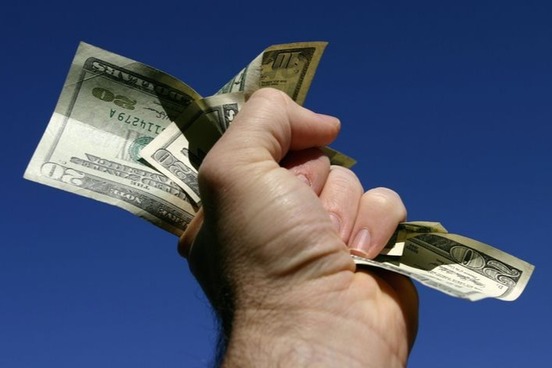
Tightwad and Tightfisted
Definition - a close or miserly person
Tightwad became current as a word for a person who spends, lends, or gives away money grudgingly, or not at all, in the beginning of the 20th century, and it likely developed from the notion of a person keeping a wad of paper money tightly rolled.
Wad is from Medieval Latin wadda and rolled into English in the 15th century as a word for small masses or bundles, as of cotton, hay, or straw. It was first printed as a word for a roll of money in the latter half of the 18th century. It then came to be used for large amounts of money, as in "wads of cash."
The adjective tightfisted might have come to mind. That word has been used to describe someone who is reluctant to part with money since the 19th century, and it more than likely was influenced by the much earlier closefisted, an antonym of openhanded which dates to the early 17th century and which, like tightfisted, implies stinginess. An early example of tightfisted comes from Charles Dickens' The Christmas Carol:
Oh! But he was a tight-fisted hand at the grindstone, Scrooge! a squeezing, wrenching, grasping, scraping, clutching, covetous, old sinner! Hard and sharp as flint, from which no steel had ever struck out generous fire; secret, and self-contained, and solitary as an oyster.
Nouns derived from the similar idea of holding money tightly are dryfist, an obsolete word for a miserly person that was popular during the 1600s, and pinchfist, which appeared a pinch before dryfist with the same meaning, and still has currency.
The three or two medals issued to those who had taken part in the 1914-18 war had the recipients' rank and names upon them. The campaign medals won in the 1939-45 war did not. Nor were they issued. If you wanted them you had to apply for them. And the authorities sent them by post in little packets. It was pinchfist parsimony.
— Peter Chapman, Grimsby Telegraph (Grimsby, Eng.), 27 Aug. 2020

Cheapskate
Definition - one who tries to avoid paying a fair share of costs or expenses
The adjective cheap has the meaning "stingy" (as in "my cheap uncle wouldn't buy us ice cream"), so it makes sense that it is part of the compound word cheapskate, meaning "a stingy person." But what about skate? Skate isn't a vanilla word for "person"—blades, boards, and marine creatures usually come to mind when one sees or hears skate.
The homograph of skate being applied is suspected to be from an alteration of English dialect skite, which is used for an offensive person. (This skate is also the source of blatherskite, a word expressive of nonsense.) Skate entered American slang and began to appear in print in the late 19th century with the contemporaneous meanings of "a worn-out, decrepit horse" and "a person especially a contemptible one."
These island horses are unhappy-looking skates, though good climbers and sliders.
— Frederick O'Brien, White Shadows in the South Seas, 1919"You're no gentleman," and she drags me into it and hollers, "Paul, this person insulted me!" and the poor skate he got ready to fight.
— Sinclair Lewis, Babbit, 1922"Willie's a good skate," the man said. "He'll tell them in town we're out here."
— Ernest Hemingway, To Have and Have Not, 1937
Cheapskate is frequently used as a closed compound (cheapskate) as well as open (cheap skate).
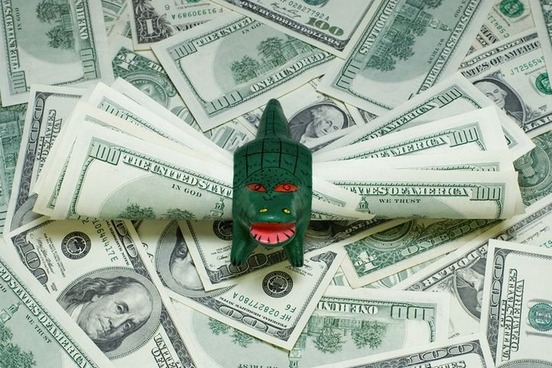
Money-grubber
Definition - a person bent on accumulating money
Grub used as a verb was unearthed in the 14th century with the meaning "to remove roots or stumps from." By the 15th century, people began applying the word to wormlike insect larva. It is the noun form that seems to have influenced the term money-grub in the 18th century for a person who is bent on accumulating money (muckworm was already in use as a derogatory word for a miser). Nowadays, money-grubber, which surfaces in the 19th century, is the preferred word, and it is used contemptuously (perhaps from the fact that such a person is despised as much as the insect itself is by gardeners):
Phil Mickelson and his merry band of money grubbers initially left the PGA Tour for, well, money, but also because they claimed they wanted golf done a new way.
— The Advocate (Newark, NJ), 11 Jun. 2023





